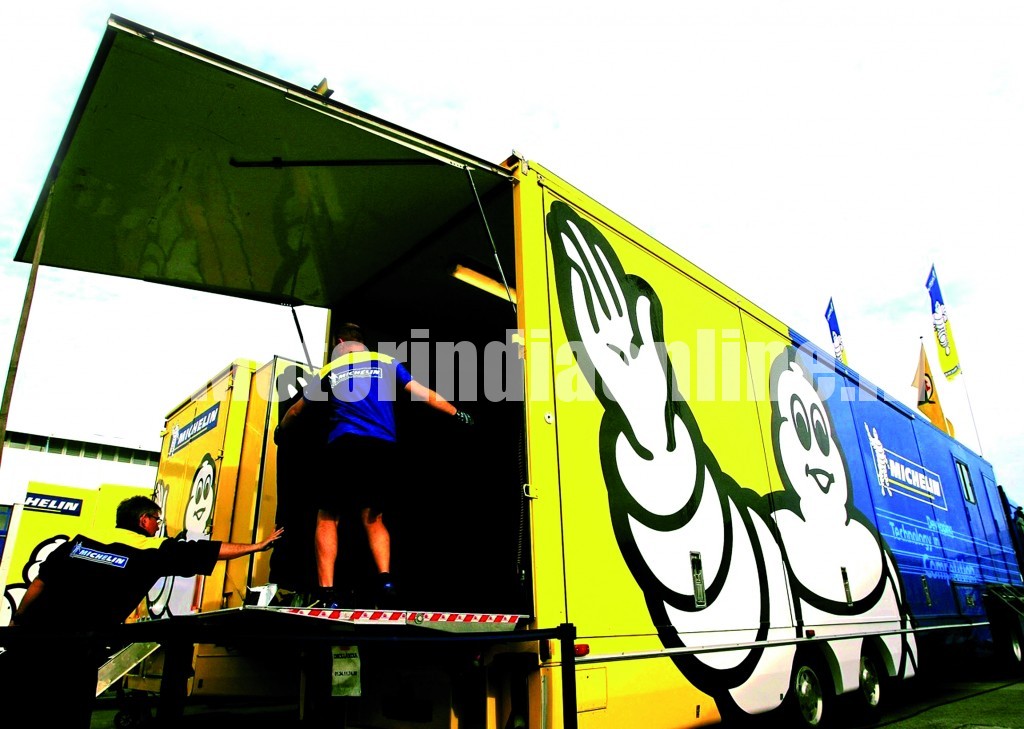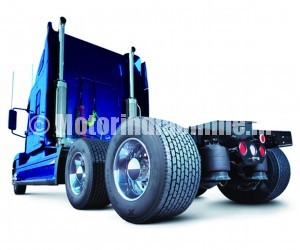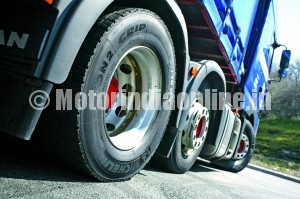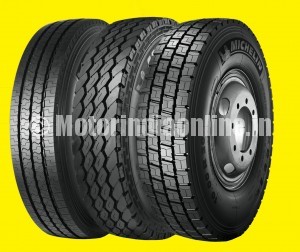“To make Michelin the undisputed leader in sustainable mobility and one of the world’s most innovative, responsible and top-performing companies”
– Mr. Jean-Dominique Senard, CEO, Michelin Tyres
Indian plant to go on stream in second half of 2013

Michelin, one of the world’s largest tyre manufacturers, is charting out plans to become the undisputed leader in sustainable mobility. Talking about his company’s plans for the short term and vision for the long term, Mr. Jean-Dominique Senard, CEO, Michelin Tyres, explains how Michelin plans to reach its ultimate goal.
You took over from Michel Rollier in May 2012, which represented the beginning of a critical new phase in Michelin’s history. How did the transition go?
Jean-Dominique Senard: It went off very well because Michel Rollier had thoroughly prepared his succession. I worked with him closely for eight years, including five as Managing Partner. Michel Rollier announced he was stepping down in February 2011, and we managed the Group together for a year, so the transition went off smoothly. Thanks to the outstanding accomplishments made since the crisis in 2008-2009 and the successful share issue in 2010, Michel Rollier built a solid foundation on which Michelin launched a New Era of Dynamic Growth, with major spending projects in Brazil, China and India. Today, we are stronger than ever before, and I am proud to have shared this adventure with him.

How would you sum up 2012?
JDS: Michelin teams once again demonstrated their ability to honor commitments. Despite an unstable international environment that saw a clear decline in demand in Europe and considerable volatility in most regions, we deployed the road map for our New Phase of Dynamic Growth in line with expectations.
Our revenue rose even though sales volumes were lower. Our operating income rose by 25 per cent to EUR 2.4 billion, which represents more than 11 per cent of sales, and our net income surpassed EUR 1.5 billion.
We invested a record total of EUR 2 billion, of which two-thirds were growth investments. This required considerable effort, but Michelin generated substantial free cash flow in 2012. As a result, our balance sheet is more robust than ever before, with debt-to-equity ratio at a record low of 12 per cent. In today’s environment, this represents a precious asset.
Backed by these very solid results, we will recommend that shareholders approve the payment of a dividend of EUR 2.40 per share, an increase of 14 per cent over last year.

How do you explain these very good results?
JDS: We are reaping the rewards of our strategic focus on innovation, international growth, competitiveness and continuous improvement in corporate management that we deployed consistently and successfully, thanks to the expertise, professionalism and commitment of our teams.
Our diversified product portfolio allows us to smooth over the ups and downs of the business cycle, while our international presence, with sales evenly divided among Western Europe, North America and the rest of the world, enabled us to withstand declining demand in Europe.
We introduced new tires whose superior technical performance sets them apart from the competing products. Their remarkable success in new markets is due largely to their robustness and outstanding longevity.
Thanks to our premium positioning and effective pricing policy, we stabilized operating margin for our car tires at a high level despite a decline in unit sales. Our priority focus on turning around the truck tire business led to a sharp improvement in operating margin even though sales volumes have dropped by more than 10 per cent. This represents an outstanding performance on the part of our teams, who have made a truly remarkable effort.
We also benefited from the substantial contribution of our specialty tire businesses, which generate structurally high margins. Lastly, we continued to enhance our productivity and competitiveness through the 2012-2016 Efficiency plan.

You’re pursuing major investment programs in Brazil, China, India and the US. How are they faring?
JDS: 2013 will open an important new era in our global development. The ramp-up of our new car and light truck tire in Itatiaia, Brazil, is proceeding well. In China, the Shenyang 2 plant launched production of truck tires in late January and will begin manufacturing car tires in May. The truck tire plant in Chennai, India, will go on stream in the second half. In the US, the new earthmover tire plant in Anderson and the new line to increase capacity at the Lexington plant will be operational at the end of the year.
At the same time, we’re investing in our European plants to make them more competitive and increase their production capacity for large-size tires. We’re developing our networks of franchised dealers around the world to provide our customers with high-quality service and advice that enables them to get the most out of our products. We expect to increase the number of sales outlets from 2,000 to 5,000 in five years. And we’re of course investing in innovative technologies, Michelin’s number one growth driver, as well as in management tools to improve our agility and efficiency.
Overall, we will invest an average of EUR 2 billion a year over the 2013-2015 period.
Does the auto industry situation in France and elsewhere in Europe constitute a threat?
JDS: If we want to maintain a solid, sustainable industry, we need to ensure that manufacturing resources in France and the rest of Europe are competitive, and this means they must be flexible. We should view the necessary adjustments as both normal and natural. The key is to be able to anticipate these adjustments and to implement them in the best manner possible with due care of employees’ interests.
Our German plants are among the most efficient in Europe because mutual understanding is inherent in the country’s employee relations and endows the industry with a remarkable ability to change.
In this respect, the agreement recently signed in France with employee representatives represents a major improvement. If it becomes law and is applied pragmatically by all parties, it could give us peace of mind regarding the future, both for companies and for their employees, for whom it delivers the real benefits.
I am convinced that de-industrialization in mature countries is not inevitable provided that decisions are made to ensure long-term competitiveness and stability in the regulatory and tax environment. One good example is the US. Following a period of deep-seated, difficult adjustments, the automobile industry there has rebounded superbly.
Too often competitiveness is analyzed solely from the point of view of labor costs. While we mustn’t neglect this aspect, it’s more important to create an environment of trust, stability and calm, constructive employee relations.
Like my predecessors, I strongly believe that the company’s performance is directly linked to the well-being and development of its people. We must do everything possible to ensure that the mutual contract that binds Michelin and its employees is understood by all to be the expression of reciprocal rights and responsibilities. That’s why we are deploying our Moving Forward Together program. It’s also why I’m committed to developing high-quality social dialogue throughout the organization, especially in France.

What is your outlook for 2013 and beyond?
JDS: In an environment shaped by growth in new markets but uncertainty in mature markets, we’re aiming for stable sales volumes in 2013 and operating income on a par with that in 2012.
Growth should pick up again in 2014, and we’re confirming our objective of approximately EUR 2.9 billion in operating income in 2015, while generating positive free cash flow every year.
Our objectives are ambitious in today’s demanding environment, but I have full confidence in our assets and in our ability to innovate and improve.
Michelin is the world leader in premium tires, for which demand is growing faster than for the market as a whole, everywhere. The increase in mobility is being accompanied by heightened demand for tires that are safe, robust, long-lasting, environmentally friendly and energy efficient. The solutions to these challenges are first and foremost technological. We have a greater capacity for innovation than any other tire company in the world. We’re going to increase this capacity to innovate by setting up new organizational structures.
More broadly, we will encourage our employees even more to express their creativity and to ensure that all good ideas are shared and deployed. We already gather nearly 50,000 innovation and progress ideas each year. They have led to very significant improvements in workplace safety, workstation ergonomics, environmental protection, energy and raw material savings, quality and productivity. We’re aiming for 100,000 ideas a year in 2020.
We will continue to reduce our cost base while becoming more agile and efficient. To achieve these goals, we’re extending the continuous improvement process developed in our plants to our support functions and research activities. We’re deploying our OPE management program to develop shared solutions for reducing inventory, preventing supply disruptions, improving customer satisfaction, making our support functions more efficient, lowering production costs and more effectively managing our margins. China will be the first country to fully deploy all components of this new program, in the second half of 2013.
2012 was the tenth anniversary of the sustainable development approach introduced by Edouard Michelin. What is the role of sustainable development in your strategy?
JDS: The Michelin Performance and Responsibility approach plays a key role because it gives meaning to our action. The strength of our strategy is that it is channeled by a mission that has always guided us and that commits us to improving mobility while responding to the challenges of lasting economic, environmental and social development. Every passing year provides additional proof of the power and relevance of our Michelin Performance and Responsibility approach. Throughout 2012, we pursued a major project to update our priorities and set our objectives for 2020, which were finalized in February 2013.
My ambition now is to go even further and make Michelin the undisputed leader in sustainable mobility and one of the world’s most innovative, responsible and top-performing companies.